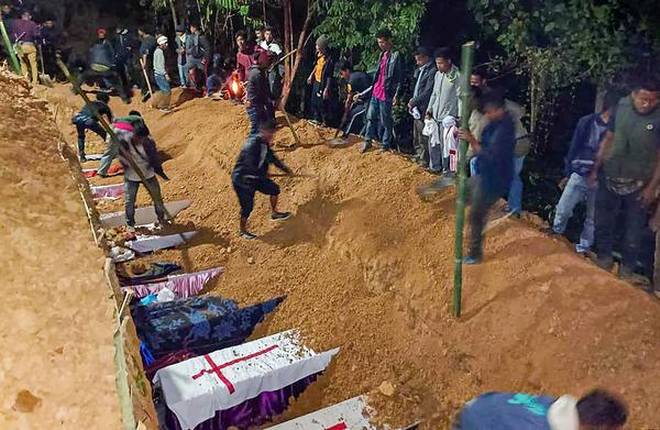AFSPA AND NAGALAND KILLINGS
M.S. HUSAIN, ADVOCATE
3/4/20246 min read


Introduction
The Armed Forces Special Powers Act, 1958 (for short ‘AFSPA’) is an act of the Parliament of India that grants special powers to the Indian Armed Forces to maintain public order in “disturbed areas”. AFSPA has been very controversial legislation from its inception. Patricia Mukhim writes that the Northeast is not only less understood by distant Delhi but also considered ‘alien’ to the nation.[1]
It is unfortunate part of our democratic structure that we adopted a colonial law, enacted to counter the Quit India Movement of 1942, to fight our own people? If independent India imposes an Act that gives legal protection to the armed forces to shoot down anyone on “suspicion” of being a terrorist/ extremist/ insurgent then how would a victim of such law differentiate with colonial and democratic form of Government?
What happened in Nagaland
The killings of at least 14 civilians and one soldier in Nagaland has caused much outrage across the nation. While the issue will be discussed in Parliament, an FIR has been registered in the case. The police have filed a case of murder against the 21 Para Special forces of the army for the incident that took place on 4 December. The Mon district police said in its FIR that the army fired with an “intention to murder”.[2]
The local police subsequently filed a first information report saying the military had not made a requisition to the police station to provide a police guide for their counterinsurgency operation and thus, “it is obvious that the intention of the security forces is to murder and injure civilians”.[3]
Human Rights Watch on Nagaland Killings
The killing of 14 civilians by the security forces in Nagaland has underscored the need for the Indian Government to immediately repeal the “abusive” Armed Forces (Special Powers) Act and prosecute the soldiers responsible, the New York City-headquartered Human Rights Watch (HWR) said on 08.12.2021.[4]
“Pledges by India’s Home Minister Amit Shah and the Army to investigate the horrific killing of 14 people will come to nothing unless those responsible are prosecuted. So long as the AFSPA protects soldiers from accountability, such atrocities will continue,” Meenakshi Ganguly, the HRW’s South Asia director, said.[5]
Indian Army on Nagaland Killings
The Army had issued a statement regretting the killing of the civilians by an elite unit near Nagaland’s Oting village on December 4, which it said was a case of “mistaken identity”. An Assam Rifles unit shot another person after protesters attacked their camp in district headquarters Mon the following day.[6]
Central Home Minister on Nagaland Killings
Mr. Shah expressed regret over the incident and said a special investigation team would probe it. But he did not clarify in Parliament whether the Central Government would give permission to prosecute those found responsible, the rights body said.[7]
What is AFSPA and why is it controversial
AFSPA gives armed forces special powers to control “disturbed areas”, which are designated by the government when it is of the opinion that a region is in such a disturbed or dangerous condition that the use of armed forces in aid of civil power is necessary. Under its provisions, the armed forces have been empowered to open fire, enter and search without warrant, and arrest any person who has committed a cognizable offence, all while having immunity from being prosecuted.[8]
Under AFSPA, the “armed forces” may shoot to kill or destroy a building on mere suspicion. A non-commissioned officer or anyone of equivalent rank and above may use force based on opinion and suspicion, to arrest without warrant, or to kill. He can fire at anyone carrying anything that may be used as a weapon, with only “such due warning as he may consider necessary”. Once AFSPA is implemented, “no prosecution… shall be instituted except with the previous sanction of the central government, in respect of anything done or purported to be done” under this Act.[9]
History of Nagaland and AFSPA
In September, 1958, AFSPA was enacted and implemented in Naga Hills which was one of the Districts of the State of Assam.
In 1963, the Government of India separated Naga Hills from Assam and named it Nagaland. So, it can be said that AFSPA is implemented in Nagaland from its inception due to insurgency in the locality of erstwhile Naga Hills and present Nagaland.
AFSPA, Nagaland and Judiciary
In 1997, after Nagaland’s most enduring insurgent outfit, the National Socialist Council of Nagalim (NSCN), led by Isak Swu and T H Muivah, first decided to talk peace with the Indian government, the Naga Peoples’ Movement for Human Rights (NPMHR) had approached the Supreme Court for revocation of the Act. But the apex court had then upheld its constitutionality, and said it was an enabling legislation that confers minimum powers on the army to operate in situations of widespread internal disorder. Public memory is short and it’s important to jog that. Irom Sharmila of Manipur had undertaken a 16-year fast against the law, with the state insisting on keeping her alive through regular medical intervention. Sharmila gave up her lonely battle in 2017 when she decided to contest the Manipur Assembly elections. Why did it take over 60 years for AFSPA to become an election issue? It was only in 2016, after many PILs were filed in the Supreme Court, that the court sought details of the 1,528 cases of alleged extra-judicial killings between May 1979 and May 2012 by the Manipur Police and the armed forces. The CBI was asked to go into a few of those cases. But in its report filed in March this year, it said it had no conclusive evidence and, therefore, closed the cases.[10] It is notable that the Supreme Court had given strict interpretation to Article 21 of the Constitution of India, 1950 in A.K. Gopalan case and in a very infamous ADM Jabalpur case but scenario changed over the period of time liberal and wide interpretation to Article 21 was given in Maneka Gandhi case and ADM Jabalpur case overruled by the Supreme Court in K.S. Puttaswamy v.UOI (AIR 2017 SC 4161). Now India is changing and this is the era of natural justice. Hence, what held by Supreme Court at that point of time cannot be said to be correct in this changed scenario as the Supreme Court itself held that the Supreme Court is Supreme but not infallible which is proved from time to time.
Where is AFSPA in effect now?
AFSPA can be implemented in an area after it has been declared as “disturbed”. The power to declare a territory “disturbed” initially lay with the states, but passed to the Centre in 1972. Section 3 of AFSPA (in J&K) says that an area can be declared disturbed if it is the “opinion of the Governor of the state or the central government” which “makes the use of armed forces in aid of the civil power necessary”.[11]
Currently, AFSPA is in effect in Jammu and Kashmir, Nagaland, Assam, Manipur (excluding seven assembly constituencies of Imphal) and parts of Arunachal Pradesh.
The law has been repealed where insurgencies have subsided, and when governments have gained confidence of managing the region using the police force. Thus, AFSPA was repealed in Tripura in 2015, and in 2018 the Centre also removed Meghalaya from the list, while also restricting its use in Arunachal Pradesh.[12]
Demand for Repeal of AFSPA
On number of occasions, misuse of the provisions of AFSPA has been exposed and the atrocities crossed all the limits.
Due to atrocities, on number of occasions demand of repeal of AFSPA arose but no heed was paid by the Government.
Nagaland Chief Minister, Neiphiu Rio has said it was time for the Centre to revoke the Armed Forces Special Powers Act. “We have been asking the government to repeal Afspa from the entire country. This is a draconian law. There are so many acts to deal with insurgency. India is a great democratic nation, but the Act and its misuse damage the image of the country.”[13]
Nagaland Government is likely to hold special Assembly session against AFSPA on December 20, 2021.[14]
“For the first time from the Nagaland government we have said the Army is guilty.” — Neiphiu Rio, Nagaland Chief Minister.[15]
AFSPA is counterproductive and despite being operational for a long time, it has not resulted in solving the problem. We urge the Government of India to repeal AFSPA” — Conrad K Sangma, Meghalaya Chief Minister.[16]
Conclusion
Considering the facts and misuse of the provisions of AFSPA, it can be said that there is no benefit of AFSPA since decades and moreover, it causes loss of believe of the people in the Government. Hence, to maintain integrity and sovereignty of India, AFSPA need to be repealed as there are various statutes regulating such type of illegal activities.
Moreover, giving unrestricted powers to the law enforcement agencies or armed personnels are not the solution rather a blot as we are a progressive and liberal nation believing in natural law justice system supporting free and fair trial.
References
↑1, ↑10
↑2
↑3, ↑4, ↑5, ↑6, ↑7
↑8, ↑9, ↑11, ↑12
https://indianexpress.com/article/explained/why-nagaland-killings-rekindled-debate-on-afspa-7659242/
↑13, ↑15, ↑16
↑14
